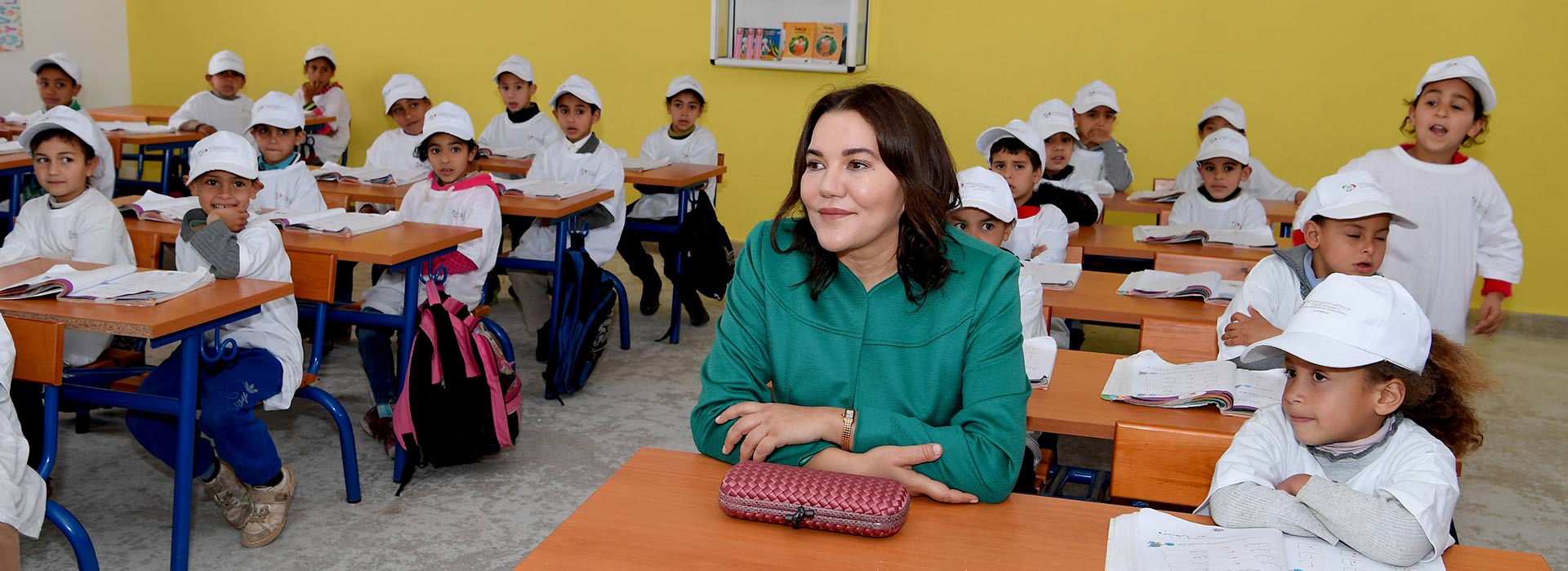Her Royal Highness Lalla Hasnaa, President of the Mohammed VI Foundation for environmental protection, visited on Friday, March 16, 2018 the Eco-school “Al Masjid” in Ain Aouda, a rural village near Rabat, on the occasion of the twelfth year of the eco-school program, one of the Foundation’s flagship to make education for Sustainable development an integral part of education of learners.
During this visit, Her Royal Highness exchanged with the pupils of the school’s monitoring committee, learners from five to twelve years old who have been working with conviction since 2010, the date of their enrollment of their establishment to the Eco-schools program. They presented to Her Royal Highness the daily eco-gestures and good practices they use for water management and energy saving. They have tackled with Her Royal Highness the problems of climate and energy through a game put on line by the Foundation to raise c learners’ awareness of these major issues.
They also showed to Her Royal Highness their interest for biodiversity conservation by presenting the aromatic and medicinal plants which they planted in the green space of their school. Her Royal Highness also inquired about initiatives taken by pupils to sort and recover waste of their establishment, or to save water in the school garden by using a localized irrigation system with plastic bottles.
“Al Masjid” school is a virtuous example of the Eco-schools program. The commitment of its learners allowed the school to obtain, in 2012, the Green Flag, the highest distinction of the program, and to renew it every year since. Mobilized by the monitoring committee, 171 pupils divided into six classes discussed the different themes of the program. In 2012, they handled waste management and food, and in 2013 and 2014, they tackled two other themes, energy and biodiversity.
“Eco-Schools” is not limited to transmitting simple knowledge. By explaining environmental issues, the program encourages children to implement concrete solutions and to modify their behavior. It teaches how to reduce, reuse and recycle waste by simple eco-gestures and encourages children to show imagination and initiative. The learners of the school “Al Masjid” made waste sorting bins with egg cartons, or cooked a healthy collective snack according to the acquired principles by approaching the theme of nutrition. They changed the light bulbs of the school by other ones with low consumption.
The learners of the Eco-School “Al Masjid” work today to pass on their experience to their immediate circle and to other establishments. They realized, with the help of the association “smile of hope”, a “Guide of the ecological pupil”.
Thanks to the networking piloted by the Foundation to disseminate experiences and best practices, the school was also bound in 2018 with another rural establishment, the Eco-school “Lboura” in Taroudant, Green Flag since 2013, with which it shares a game on the electrical consumption of domestic appliances, made with recycled materials.
The engagement and activity of the school “Al Masjid” make it receive a special attention. Particularly, it was the subject of a television report in April 2016, on the sidelines of the signing of the partnership agreement between the Foundation and UNESCO.
The “Al Masjid” school symbolizes the remarkable progress that the Eco-school program has seen for twelve years. Conceived by the international Foundation for Environmental Education (FEE) and introduced in Morocco by the Mohammed VI Foundation for Environmental protection, in cooperation with the Ministry of National Education, Vocational training, Higher Education and Scientific Research, Eco-Schools is intended for leaners of the preschool and the primary school and its objective is to inculcate in them the basics of ecological behavior.
Eco-Schools is one of the main programs which, spurred on by Her Royal Highness Lalla Hasnaa, the Foundation has been developing since its creation in 2001 to educate and make sensitive to the environment all audiences, learners as adults or decision-makers, so that the gestures of the everyday life, the decisions of the companies or the politics of the administrations become naturally environmentally-friendly.
Through almost twenty programs developed in education, climate and air quality, coast protection, sustainable tourism, the palm grove of Marrakesh or the historic gardens, Her Royal Highness Lalla Hasnaa takes the initiative and mobilizes all actors, citizens, companies and public authorities, to create collective dynamics.
To give itself the means to achieve the objectives of education and of raising awareness that it has set itself, the Foundation is involved in the global dynamic led by United Nations. It has adhered in the United Nations Global Action Program (GAP) set up in 2014 at the launch of the second decade of education for Sustainable development (2014-2024).
The Foundation signed partnerships with major international institutions such as UNESCO, FAO, the United Nations Environment Program, ISESCO and the UNFCCC to mobilize their expertise, and their considerable means. It concentrates its efforts on the capacity building of trainers, the most effective and immediate means to enhance its action and reach quickly a generalization of the teaching of education for sustainable development in Morocco.
The Foundation shares finally its experience in Africa, where it has been supporting since COP 22 in Marrakesh the Kingdom’s efforts to accompany the countries of the continent in this sensitization.
Eco-Schools
Today, more than 68 countries around the world have adopted the Eco-Schools program, launched by the FEE (the Foundation for Environmental Education). In Morocco, it was implanted by the Mohammed VI Foundation for environmental protection in 2006 www.fm6e.org in partnership with the Ministry of Education, Vocational training, scientific research and Higher education. 1925 schools are registered in it among which 44 % rural and 56% urban. 262 were awarded the Green Flag in addition to 71 schools obtained a silver certificate and 93 a bronze certificate.




